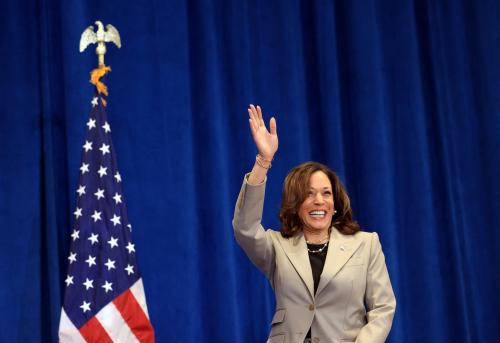In conventional wisdom, the two Georgia Senate races are set up to be a titanic struggle between Democrats and Republicans over which party will control the Senate for the first two years of the incoming Biden-Harris administration.
The two Democrats—Jon Ossoff and Reverend Ralph Warnock—are arguing that their election is required if the Biden-Harris campaign promises can become law, at least in some form. Their opponents—current Senators Kelly Loeffler and David Perdue—and their surrogates will be warning Georgians that their election is all that stands between where the country is now and turning “socialist.”
The reality, of course, is very different. If both Senate candidates win then the Senate will be tied 50-50 and Vice President Kamala Harris will be able to case the tie-breaking vote—unless one of the Democrats fails to vote with the rest of his party. This explains why the real potential winner if both Ossoff and Warnock prevail is someone who up to now hasn’t figured at all into the conversation about these races: Democratic Senator Joe Manchin of West Virginia. That’s because, as a centrist, some would say conservative Democrat, Manchin’s vote is likely to be the deciding one on all of the legislation that the new administration will be asking Congress to enact.
Manchin has a history of being an independent thinker, certainly not a socialist. As governor of his state between 2005 and 2010, Manchin defied labeling, with a record as a pragmatist: cutting taxes, raising teacher pay, and fixing the state’s broken worker compensation system, all the while reducing the state’s debt.
In the Senate, amidst growing political polarization, Manchin has bucked the tide, standing as one of few senators still on the lookout for bipartisan compromises to issues. Through 2018, Manchin more frequently voted for rather than against Trump-supported initiatives, though he did oppose the 2017 Trump tax cut, and efforts to repeal or cut back the Affordable Care Act which President Biden wants to expand with a public option. Like Biden, Manchin has come out strongly against efforts to “defund the police.” And to progressives’ ire, Manchin recently has said he would oppose “crazy stuff”—prominently citing as an example any proposals to expand the size of the Supreme Court.
To be sure, there is a bloc of progressive senators wanting expansive legislation on each of the matters central to the Biden-Harris legislative agenda: pandemic-related fiscal stimulus, climate change, infrastructure investment (much of it tied to mitigating or adapting to climate change), and addressing systemic racism—not just in the criminal justice system, but in housing and economic opportunity as well. But even if these senators stick together on every detail, if any legislation goes too far, Manchin can block it, which brings him back to being the deciding vote on all of the Biden-Harris legislative agenda if the two Georgia Democrats win their Senate races.
Of course, this could all change after the 2022 mid-terms, when the balance of the Senate could easily shift again in the direction of either party, which would mean that Manchin would lose the power he could have for the next two years. But those two years will be critical to any legislative success of the incoming administration, since it is rare for an administration’s party to gain seats in a mid-term election, which is the major reason why, for most administrations, the zenith of their power exists in its first two years.
There are reasons, at least so far, that Manchin’s potentially pivotal role over the next two years in the Senate has not been played up or down, at least to date, in the Georgia Senate campaigns. Democrats eager to get out as many traditional Democratic voters as possible may be worried that any spotlight on Manchin could depress their base turnout. For their part, Republicans don’t want to acknowledge that a Manchin-tempered Senate totally undermines their claims that their opponents would lead to some kind of socialist takeover of the government.
So don’t expect much to be said about Joe Manchin in Georgia. But if the two Democrats win, you’ll be hearing a lot more about Manchin shortly thereafter. It is his name that is truly on the Georgia Senate ballots in January.
The Brookings Institution is committed to quality, independence, and impact.
We are supported by a diverse array of funders. In line with our values and policies, each Brookings publication represents the sole views of its author(s).








Commentary
Who will hold the most power in the next Senate?
November 16, 2020